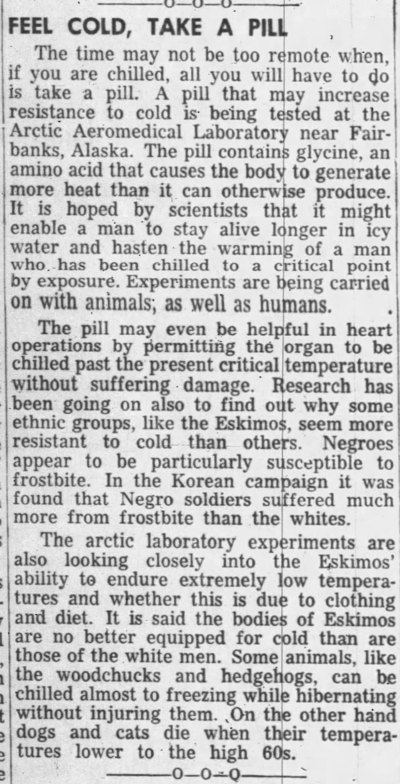Warming Pills
Glycine is readily available as a supplement. I hadn't heard about its supposed warming properties.

I searched for the research that inspired the newspaper report above and found a 1956 study, conducted at the Arctic Aeromedical Laboratory, that involved immersing dogs in freezing water. The researchers measured how long it took for the rectal temperature of the dogs to lower to 26°C. Dogs that had been given glycine took longer to chill (and warmed up more rapidly) than the control group:
However, I then found a 1961 study, also from the Arctic Aeromedical Laboratory (but this time conducted on humans) that seemed to cast doubt on the warming properties of glycine:
I think I'll stick with whiskey for warmth.

Scranton Times-Tribune - July 25, 1957
I searched for the research that inspired the newspaper report above and found a 1956 study, conducted at the Arctic Aeromedical Laboratory, that involved immersing dogs in freezing water. The researchers measured how long it took for the rectal temperature of the dogs to lower to 26°C. Dogs that had been given glycine took longer to chill (and warmed up more rapidly) than the control group:
Immersion Hypothermia: Effect of Glycine.
The intravenous administration of a 5% glycine solution caused a significant increase of 34.6 minutes in the time required to lower the rectal temperature of dogs from 38°C to 26°C. Total rewarming time was decreased by 34.3 minutes in the glycine treated group. The differences in cooling and rewarming rates between the treated and non-treated animals was due to the increased heat production observed in the dogs receiving glycine. The possible applicability of thermogenic agents in accidental hypothermia is discussed.
The intravenous administration of a 5% glycine solution caused a significant increase of 34.6 minutes in the time required to lower the rectal temperature of dogs from 38°C to 26°C. Total rewarming time was decreased by 34.3 minutes in the glycine treated group. The differences in cooling and rewarming rates between the treated and non-treated animals was due to the increased heat production observed in the dogs receiving glycine. The possible applicability of thermogenic agents in accidental hypothermia is discussed.
However, I then found a 1961 study, also from the Arctic Aeromedical Laboratory (but this time conducted on humans) that seemed to cast doubt on the warming properties of glycine:
Thirty grams of glycine were administered orally to five volunteer, male subjects who were subsequently exposed nude to an environment of 10° C. Measurements of rectal and extremity surface temperatures and whole body metabolic rates failed to show any statistically significant effects that could be attributed to the influence of glycine, as compared to glucose control measurements, throughout a 1-hour cold exposure.
I think I'll stick with whiskey for warmth.
Comments
I always heard it was brandy, not whiskey, that was in the little casks of the St. Bernard.
I also was told in school that alcohol brings a flush to the imbiber's skin, making them feel warmer, but it lets the body heat cool faster so it's the last thing you should give someone suffering from hypothermia.
I remember a short science film, I think it was produced by the local Public TV station in the mid-1980s(?) about a study done by the University of Minnesota, Duluth Campus, where they studies why some people could handle the temperature of Lake Superior, and others couldn't.
I also was told in school that alcohol brings a flush to the imbiber's skin, making them feel warmer, but it lets the body heat cool faster so it's the last thing you should give someone suffering from hypothermia.
I remember a short science film, I think it was produced by the local Public TV station in the mid-1980s(?) about a study done by the University of Minnesota, Duluth Campus, where they studies why some people could handle the temperature of Lake Superior, and others couldn't.
Posted by mjbird on 08/15/23 at 08:24 AM
Hopefully, the humans they froze in the 2nd test were the bast***s who put the dogs in cold water before.
Posted by Virtual in Carnate on 08/15/23 at 11:37 AM
@mjbird: you're right on the second point, and therefore wrong on the first. St. Bernard dogs never carried any alcohol, exactly because it kills a hypothermic person. In reality, they dug victims out, guided the monks to them, and kept them warm with their body heat.
Posted by Richard Bos on 08/19/23 at 05:24 AM
Commenting is not available in this channel entry.

Category: Experiments | 1950s